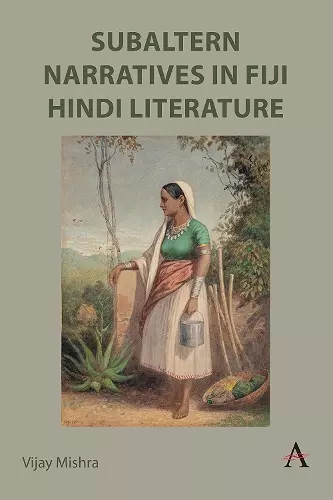Subaltern Narratives in Fiji Hindi Literature
Format:Hardback
Publisher:Anthem Press
Published:13th Feb '24
Should be back in stock very soon

A fascinating, distinctive and illuminating text that insightfully explores with reference to Fiji Hindi literature the importance of vernacular literature in the reconceived fields of diasporic, subaltern and postcolonial studies.
Subaltern Narratives in Fiji Hindi Literature is the first serious study of fiction written in Fiji Hindi. The book makes a case for a subaltern voice speaking and argues that subaltern writing constitutes the silent underside of world literature whose canon it silently challenges and subverts.
Subaltern Narratives in Fiji Hindi Literature is the first comprehensive study of fiction written in Fiji Hindi that moves beyond the hegemonic and colonially-implicated perspectives that have necessarily informed top-down historical accounts. Mishra makes this case using two extraordinary novels Ḍaukā Purān [‘A Subaltern Tale’] (2001]) and Fiji Maa [‘Mother of a Thousand’] (2018) by the Fiji Indian writer Subramani. They are massive novels (respectively 500 and 1,000 pages long) written in the devanāgarī (Sanskrit) script. They are examples of subaltern writing that do not exist, as a legitimation of the subaltern voice, anywhere else in the world. The novels constitute the silent underside of world literature, whose canon they silently challenge. For postcolonial, diaspora and subaltern scholars, they are defining (indeed definitive) texts without which their theories remain incomplete. Theories require mastery of primary texts and these subaltern novels, ‘heroic’ compositions as they are in the vernacular, offer a challenge to the theorist.
Postcolonial Text
The Fiji Times
The primary virtue of Subaltern Narratives in Fiji Hindi Literature is that it gives us a comprehensive and clear idea of the richness of Subramani’s two novels. It has a finely tuned focus but pushes our thinking into a much wider vision of postcolonial writing. — Postcolonial Text
To have an eye like Mishra to capture the intricate details in the two novels is extraordinary. While he gives full justification to the language through proper linguistic analysis, he does not fail to explain the emotions in the novel often demonstrated through the words of the characters. — The Fiji Times
“We owe a great debt to Vijay Mishra for making Subramani’s two wonderful books available to us in translation, and for giving us a critical frame to understand their history and achievement. In transliteration, Subramani’s language is a revelation and dazzles with intimate details and striking ambition. As attention to oceanic literatures and the Indian labour diaspora continues to grow, Subramani’s Fiji Hindi novels and Vijay Mishra’s reading will surely and deservedly gather readers and acclaim.” — Francesca Orsini, FBA, Professor emerita, SOAS, University of London
“In his groundbreaking book, Vijay Mishra offers a scholarly but accessible study of the novels of the Fiji Indian writer Subramani. Mishra approaches these novels on their own terms, while also linking them with the traditions of folk humour, the carnivalesque and the picaresque in European literature.” — Elizabeth Jackson, Senior Lecturer in Literatures in English at the University of the West Indies (Trinidad)
“Subaltern Narratives offers English-speaking readers a profound understanding of Fiji-Hindi as a literary language, by means of extended translational analyses of two vernacular Hindi masterpieces by Subramani. In this book, Mishra dignifies both his own experience of Fiji-Hindi and the experience of other subaltern language communities around the world.” — John O’Carroll, Charles Sturt University, Australia
“The magic carpet of the Indian diaspora on which V. S. Naipaul and Salman Rushdie flew to worldwide renown is flipped in this book to reveal its granular underside. This is a sophisticated analysis of two epic novels written not in elite English but in a doubly subaltern language – a Hindi dialect vernacularized by Indian bonded labourers in Fiji. This is a dot on the world map writing back to global discourse.” — Harish Trivedi, University of Delhi
ISBN: 9781839990700
Dimensions: 229mm x 153mm x 16mm
Weight: 454g
226 pages